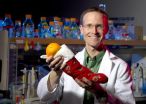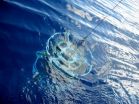(Press-News.org)
VIDEO:
BYU nutritionist Tory Parker talks about his study into why oranges are so good for you.
Click here for more information.
Provo, Utah - In time for Christmas, BYU nutritionists are squeezing all the healthy compounds out of oranges to find just the right mixture responsible for their age-old health benefits.
The popular stocking stuffer is known for its vitamin C and blood-protecting antioxidants, but researchers wanted to learn why a whole orange is better for you than its components when taken separately. The ultimate outcome of the research could be a super-supplement that captures the best health benefits of eating oranges and drinking orange juice.
"There's something about an orange that's better than taking a vitamin C capsule, and that's really what we're trying to figure out," said Tory Parker, BYU assistant professor of nutrition, dietetics and food science. "We think it's the particular mixture of antioxidants in an orange that makes it so good for you."
The team published the best health-promoting combinations of those natural antioxidants in a recent issue of the Journal of Food Science. The paper's lead author, Brenner Freeman, was a BYU undergrad when he conducted the research.
Now applying to medical schools, Brenner chose to study oranges because he was raised on a citrus orchard in Arizona.
"I spent a lot of time hunched over a lab bench in the dark doing this research," Freeman said. "But what I learned was worth it, and having this publication definitely gives me an advantage on my med school applications."
Parker explained that every time we eat carbs and fat, we increase the amount of free radicals in our blood. Over time, that increases our chance for hardened arteries and heart disease. But eating fruit protects us from that effect for a few hours after every meal.
"Carbs and fat increase free radicals, and fruit and internal antioxidants counteract that," Parker said. "That means fruit should be your dessert – remember, before cookies, candy and other sugary snacks became so widespread, fruit was our 'sweet.'"
Parker noted supplement companies often mix "high concentrations of extracts from blueberry and blackberry and orange and throw them all together and hope it's good."
He wanted to avoid such assumptions by testing dozens of combinations of the antioxidants found in an orange at the same proportions they occur naturally.
"We're looking for synergistic effects," Parker said. "Cases where the effect of two or more antioxidants together was stronger than the sum of them separately."
In conclusion, they identified several combinations of antioxidants that were the most synergistic – the compounds hesperidin and naringenin, in particular, appeared to contribute the most punch in the combinations.
Those are the mixtures Parker will continue to research in human studies to evaluate whether their health effects mimic those of eating an orange. He and his students are also conducting similar work with blueberries and strawberries.
BYU has applied for patents on the best antioxidant mixtures from all three fruits, and they are available for license by companies for further development.
"I'm really most interested in protecting healthy people and keeping the healthy, healthy," Parker said. "And no matter what our research finds, it's very clear that a great way to do that is to simply eat more fruit."
INFORMATION:
The orange in your stocking: researchers squeezing out maximum health benefits
2010-12-21
ELSE PRESS RELEASES FROM THIS DATE:
Link between depression and inflammatory response found in mice
2010-12-21
Vanderbilt University researchers may have found a clue to the blues that can come with the flu – depression may be triggered by the same mechanisms that enable the immune system to respond to infection.
In a study in the December issue of Neuropsychopharmacology, Chong-Bin Zhu, M.D., Ph.D., Randy Blakely, Ph.D., William Hewlett, M.D., Ph.D., and colleagues activated the immune system in mice to produce "despair-like" behavior that has similarities to depression in humans.
"Many people exhibit signs of lethargy and depressed mood during flu-like illnesses," said Blakely, ...
Boosting supply of key brain chemical reduces fatigue in mice
2010-12-21
Researchers at Vanderbilt University have "engineered" a mouse that can run on a treadmill twice as long as a normal mouse by increasing its supply of acetylcholine, the neurotransmitter essential for muscle contraction.
The finding, reported this month in the journal Neuroscience, could lead to new treatments for neuromuscular disorders such as myasthenia gravis, which occurs when cholinergic nerve signals fail to reach the muscles, said Randy Blakely, Ph.D., director of the Vanderbilt Center for Molecular Neuroscience.
Blakely and his colleagues inserted a gene into ...
Dodds contributes to new national study on nitrogen water pollution
2010-12-21
MANHATTAN, KAN. -- A Kansas State University professor is part of a national research team that discovered that streams and rivers produce three times more greenhouse gas emissions than estimated by the Intergovernmental Panel on Climate Change.
Through his work on the Konza Prairie Biological Station and other local streams, Walter Dodds, university distinguished professor of biology, helped demonstrate that nitrous oxide emissions from rivers and streams make up at least 10 percent of human-caused nitrous oxide emissions -- three times greater than current estimates ...
Research shows that environmental factors limit species diversity
2010-12-21
It's long been accepted by biologists that environmental factors cause the diversity—or number—of species to increase before eventually leveling off. Some recent work, however, has suggested that species diversity continues instead of entering into a state of equilibrium. But new research on lizards in the Caribbean not only supports the original theory that finite space, limited food supplies, and competition for resources all work together to achieve equilibrium; it builds on the theory by extending it over a much longer timespan.
The research was done by Daniel Rabosky ...
Robotic surgery for head and neck cancer shows promise
2010-12-21
BIRMINGHAM, Ala. – Less-invasive robotic surgery for upper airway and digestive track malignant tumors is as effective as other minimally invasive surgical techniques based on patient function and survival, according to University of Alabama at Birmingham researchers.
Head and neck squamous cell carcinomas account for about 4 percent of malignant tumors diagnosed in the United States each year. Currently the standard minimally invasive surgery for these tumors is transoral laser microsurgery.
Previous studies have shown that the robotic surgery was better for patients ...
Global rivers emit 3 times IPCC estimates of greenhouse gas nitrous oxide
2010-12-21
What goes in must come out, a truism that now may be applied to global river networks.
Human-caused nitrogen loading to river networks is a potentially important source of nitrous oxide emission to the atmosphere. Nitrous oxide is a potent greenhouse gas that contributes to climate change and stratospheric ozone destruction.
It happens via a microbial process called denitrification, which converts nitrogen to nitrous oxide and an inert gas called dinitrogen.
When summed across the globe, scientists report this week in the journal Proceedings of the National Academy ...
Ocean acidification changes nitrogen cycling in world seas
2010-12-21
Increasing acidity in the sea's waters may fundamentally change how nitrogen is cycled in them, say marine scientists who published their findings in this week's issue of the journal Proceedings of the National Academy of Sciences (PNAS).
Nitrogen is one of the most important nutrients in the oceans. All organisms, from tiny microbes to blue whales, use nitrogen to make proteins and other important compounds.
Some microbes can also use different chemical forms of nitrogen as a source of energy.
One of these groups, the ammonia oxidizers, plays a pivotal role in determining ...
Malaria-infected cells stiffen, block blood flow
2010-12-21
VIDEO:
Malaria-infected red blood cells can be 50 times stiffer and have surface changes that disrupt the smooth flow of blood, depriving the brain and other organs of nutrients and oxygen....
Click here for more information.
PROVIDENCE, R.I. [Brown University] — Although the incidence of malaria has declined in all but a few countries worldwide, according to a World Health Organization report earlier this month, malaria remains a global threat. Nearly 800,000 people ...
Intensive chemotherapy can dramatically boost survival of older teenage leukemia patients
2010-12-21
More effective risk-adjusted chemotherapy and sophisticated patient monitoring helped push cure rates to nearly 88 percent for older adolescents enrolled in a St. Jude Children's Research Hospital acute lymphoblastic leukemia (ALL) treatment protocol and closed the survival gap between older and younger patients battling the most common childhood cancer.
A report online in the December 20 edition of the Journal of Clinical Oncology noted that overall survival jumped 30 percent in the most recent treatment era for ALL patients who were age 15 through 18 when their cancer ...
Waterways contribute to growth of potent greenhouse gas
2010-12-21
EAST LANSING, Mich. — Nitrous oxide, a potent greenhouse gas, has increased by more than 20 percent over the last century, and nitrogen in waterways is fueling part of that growth, according to a Michigan State University study.
Based on this new study, the role of rivers and streams as a source of nitrous oxide to the atmosphere now appears to be twice as high as estimated by the Intergovernmental Panel on Climate Change, according to Stephen Hamilton, a professor at MSU's Kellogg Biological Station. The study appears in the current issue of the Proceedings of the Academy ...


